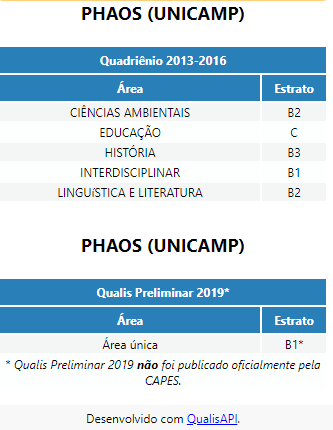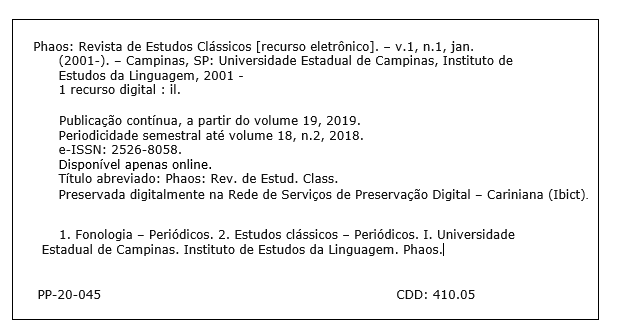Focus and Scope
Phaos: Journal of Classical Studies is a yearly academic and cultural journal edited by the area of Classical Studies in the Linguistics Department of the State University of Campinas (Universidade Estadual de Campinas, UNICAMP). Its main purpose is to provide Brazilian and foreign researchers with a qualified medium for publishing work concerned with Graeco-Latin civilization in general, including its ancient and modern reception. It additionally publishes reviews of books in the field of Classical Studies and annotated translations of ancient Greek and Roman authors. By these means, the journal intends to be an outlet for original work on the Graeco-Roman world, to promote interdisciplinarity among the different disciplines concerned with the Antiquity, both inside and outside the Institute of Language Studies (Instituto de Estudos da Linguagem, IEL) in the State University of Campinas, and thus to support academic exchanges with researchers in other fields and institutions.Peer Review Process
All manuscripts submitted to Phaos are assessed by two reviewers that either comprise the journal’s Editorial Counsel or that are exceptionally chosen ad hoc from leading scholars in the specialty area concerned by the submission. In case a manuscript is accepted by one reviewer and rejected by the other, a third reviewer will be contacted. The manuscript will be published in case there are at least two positive reviews. The author or authors of the article, book review or translation must incorporate the corrections and suggestions that might be made by the reviewers. The reviewers will assess whether the manuscript is philologically accurate as well as whether it is in line with the journal’s profile and follows the guidelines specified below.
Periodicity
Since 2019, the journal has been operating under a Continuous Publication model.
Free Access Policy
This journal grants immediate free access to all of its contents, under the belief that free availability of academic knowledge promotes the democratization of knowledge on a global scale.Qualis/Capes Evaluation

Source: Sucupira/Qualis, 2018.

